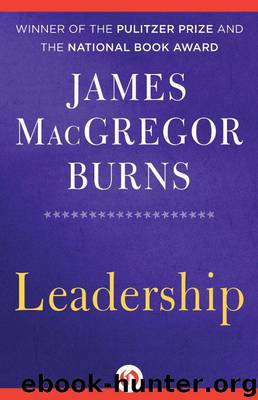Leadership (Harper Perennial Political Classics) by James MacGregor Burns

Author:James MacGregor Burns
Language: eng
Format: mobi
ISBN: 9781453245279
Publisher: Open Road Media
Published: 2012-04-09T14:00:00+00:00
Voting: The Conversion of Opinion
“How does this vague, fluctuating, complex thing we call public opinion—omnipotent yet indeterminate, a sovereign to whose voice everyone listens, yet whose words, because he speaks with so many tongues as the waves of a boisterous sea, it is so hard to catch—how does public opinion express itself in America …?” Lord Bryce asked. The best index to public opinion in the United States and other Western democracies, Bryce felt, was election results. With the advent of polling and other techniques of measuring opinion, students of the subject have less confidence than Bryce in the extent to which elections mirror popular attitudes with any exactitude. Elections are more important than polls, however, as a link between opinion and government action; elections are both a rough reflection of opinion and a decision.
For political leaders an election is an opportunity to convert realigned political support into government office, status, and power. They must bring together aggregations of political attitudes and election processes. Public opinion, as they see it, is a congeries of existing and potential attitudes in all conditions of consensus and cross-cutting cleavage, as vague and fluctuating in appearance as Bryce noted. The election system, moreover, is never neutral. Even the most elaborate attempts to produce elections that perfectly mirror public opinion produce some distortion, if only as a result of mechanical problems; more important, the theoretical basis on which the election arrangements are established has profound consequences for the conversion of public opinion into government policy and action. The Weimar Republic, with its mathematically impressive system of transferring and pooling votes in order to reflect every ripple of public opinion, was incapable of identifying and acting on the aggregated and unifying—as against the proportionate and plural—attitudes that might have made survival of the republic possible. In France, under certain constitutions, the existence of a “list” system in multiple-member constituencies and the order of placement of individual candidates on the list had major consequences for what candidates were elected and hence what sets of political attitudes might be directly represented in government.
The ways in which parties nominate candidates, the ability of nonparty groups to put candidates on the ballot through petition-gathering or other devices, laws regulating political money, the size of constituencies and the “fairness” with which they are drawn up, the number of offices filled by election and the extent to which different constituencies overlap one another, the mechanics of voting on election day—these and a host of other factors produce endless mixes of electoral arrangements. Effective political leaders must know how their election systems operate—and can be operated. And they must have a grasp of public opinion not only in its general form but in the way that it responds to particular electoral influences. In New Zealand this would mean recognizing the continued force of class voting despite the claim of many New Zealanders that theirs is a classless society. In Norway it would mean recognition of the special importance of the interaction of geography, climate, religion, social class, and an underlying disquiet about the role of central authority.
Download
This site does not store any files on its server. We only index and link to content provided by other sites. Please contact the content providers to delete copyright contents if any and email us, we'll remove relevant links or contents immediately.
Hit Refresh by Satya Nadella(9121)
The Compound Effect by Darren Hardy(8941)
Change Your Questions, Change Your Life by Marilee Adams(7753)
Nudge - Improving Decisions about Health, Wealth, and Happiness by Thaler Sunstein(7689)
The Black Swan by Nassim Nicholas Taleb(7104)
Deep Work by Cal Newport(7059)
Rich Dad Poor Dad by Robert T. Kiyosaki(6600)
Daring Greatly by Brene Brown(6501)
Principles: Life and Work by Ray Dalio(6413)
Playing to Win_ How Strategy Really Works by A.G. Lafley & Roger L. Martin(6217)
Man-made Catastrophes and Risk Information Concealment by Dmitry Chernov & Didier Sornette(6001)
Big Magic: Creative Living Beyond Fear by Elizabeth Gilbert(5752)
Digital Minimalism by Cal Newport;(5747)
The Myth of the Strong Leader by Archie Brown(5495)
The Slight Edge by Jeff Olson(5408)
Discipline Equals Freedom by Jocko Willink(5377)
The Motivation Myth by Jeff Haden(5202)
The Laws of Human Nature by Robert Greene(5166)
Stone's Rules by Roger Stone(5080)
